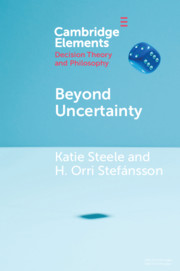Bibliography
Anscombe, F. J. and Aumann, R. J. (1963). A definition of subjective probability. Annals of Mathematical Statistics 34(1), 199–205.
Arntzenius, F. (2008). No regrets, or: Edith Piaf revamps decision theory. Erkenntnis 68(2), 277–97.
Bolker, E. D. (1967). A simultaneous axiomatisation of utility and subjective probability. Philosophy of Science 34(4), 333–40.
Bradley, R. (2005). Radical probabilism and Bayesian conditioning. Philosophy of Science 72(2), 342–64.
Bradley, R. (2017). Decision Theory with a Human Face. Cambridge University Press.
Briggs, R. A. (2009). Distorted reflection. Philosophical Review 118(1), 59–85.
Bryant, B. P. and Lempert, R. J. (2010). Thinking inside the box: A participatory, computer-assisted approach to scenario discovery. Technological Forecasting and Social Change 77(1), 34–49.
Buchak, L. (2013). Risk and Rationality. Oxford University Press.
Bykvist, K. and Stefánsson, H. O. (2017). Epistemic transformation and rational choice. Economics and Philosophy 33(1), 125–38.
de Canson, C. (ms.). The nature of awareness growth.
Diaconis, P. and Zabell, S. L. (1982). Updating subjective probability. Journal of the American Statistical Association 77(380), 822–30.
Earman, J. (1992). Bayes or Bust? A Critical Examination of Bayesian Confirmation Theory. MIT Press.
Fagin, R. and Halpern, J. Y. (1987). Belief, awareness, and limited reasoning. Artificial Intelligence 34(1), 39–76.
Gilboa, I. and Schmeidler, D. (1995). Case-based decision theory. Quarterly Journal of Economics 110(3), 605–39.
Gilboa, I. and Schmeidler, D. (2001). A Theory of Case-Based Decisions. Cambridge University Press.
Glymour, C. (1980). Why I am not a Bayesian. In C. Glymour (ed.), Theory and Evidence, pp. 63–93. Princeton University Press.
Grant, S. and Quiggin, J. (2013a). Bounded awareness, heuristics and the precautionary principle. Journal of Economic Behavior & Organization 93(C), 17–31.
Grant, S. and Quiggin, J. (2013b). Inductive reasoning about unawareness. Economic Theory 54(3), 717–55.
Groves, D. G. and Lempert, R. J. (2007). A new analytic method for finding policy-relevant scenarios. Global Environmental Change 1 7(1), 73–85.
Hájek, A. (2003). What conditional probability could not be. Synthese 137(3), 273–323.
Hájek, A. Omega. Unpublished manuscript.
Hansson, S. O. (2009). From the casino to the jungle. Synthese 168(3), 423–32.
Hedden, B. (2015). Reasons Without Persons: Rationality, Identity, and Time. Oxford University Press.
Heifetz, A., Meier, M., and Schipper, B. (2006). Interactive unawareness. Journal of Economic Theory 130(1), 78–94.
Heifetz, A., Meier, M., and Schipper, B. C. (2008). A canonical model for interactive unawareness. Games and Economic Behavior 62(1), 304–24.
Henderson, L., Goodman, N. D., Tenenbaum, J. B., and Woodward, J. F. (2010). The structure and dynamics of scientific theories: A hierarchical Bayesian perspective. Philosophy of Science 77(2), 172–200.
Hill, B. (2010). Awareness dynamics. Journal of Philosophical Logic 39(2), 113–37.
Jeffrey, R. (1965). The Logic of Decision. University of Chicago Press.
Joyce, J. M. (1998). A nonpragmatic vindication of progabilism. Philosophy of Science 65(4), 575–603.
Joyce, J. M. (1999). The Foundations of Causal Decision Theory. Cambridge University Press.
Karni, E. and Vierø, M.-L. (2013). ‘Reverse Bayesianism’: A choice-based theory of growing awareness. American Economic Review 103(7), 2790–810.
Karni, E. and Vierø, M.-L. (2015). Probabilistic sophistication and reverse Bayesianism. Journal of Risk and Uncertainty 50(3), 189–208.
Karni, E. and Vierø, M.-L. (2017). Awareness of unawareness: A theory of decision making in the face of ignorance. Journal of Economic Theory 168, 301–25.
Kuhn, T. S. (1962). The Structure of Scientific Revolutions. University of Chicago Press.
Maher, P. (1995). Probabilities for new theories. Philosophical Studies 77(1), 103–15.
Mahtani, A. (2020). Awareness growth and dispositional attitudes. Synthese, 1–17.
McClennen, E. F. (1990). Rationality and Dynamic Choice: Foundational Explorations. Cambridge University Press.
Nakicenovic, N., et al. (2000). Special report on emissions scenarios: A special report of Working Group III of the Intergovernmental Panel on Climate Change. Cambridge University Press.
Paul, L. A. (2014). Transformative Experience. Oxford University Press.
Pettigrew, R. (2020). Dutch Book Arguments. Cambridge University Press.
Piermont, E. (2017). Introspective unawareness and observable choice. Games and Economic Behavior 106(C), 134–52.
Quiggin, J. (2016). The value of information and the value of awareness. Theory and Decision 80(2), 167–85.
Ramsey, F. P. (1990/1926). Truth and probability. In Mellor, D. H. (ed.), Philosophical Papers, pp. 52–94. Cambridge University Press.
Roussos, J. (2020). Policymaking under scientific uncertainty. PhD thesis, London School of Economics and Political Science.
Savage, L. (1954). The Foundations of Statistics. John Wiley & Sons.
Schipper, B. C. (2015). Awareness. In H. van Ditmarsch, Halpern, J. Y., W. van der Hoek, and B. Kooi (eds.), Handbook of Epistemic Logic, pp. 77–146. College Publications.
Schwartz, P. (1996). The Art of the Long View: Planning in an Uncertain World. Currency-Doubleday.
Shimony, A. (1970). Scientific inference. In R. Colodny (ed.), The Nature and Function of Scientific Theories, pp. 79–172. University of Pittsburgh Press.
Stalnaker, R. (1984). Inquiry. MIT Press.
Steele, K. (2010). What are the minimal requirements of rational choice? Arguments from the sequential-decision setting. Theory and Decision 68(4), 463–87.
Steele, K. (2018). Dynamic decision theory. In Hansson, S. O. and Hendricks, V. F. (eds.), Introduction to Formal Philosophy, pp. 657–67. Springer.
Stefánsson, H. O. and R. Bradley (2019). What is risk aversion? British Journal for the Philosophy of Science 70(1), 77–102.
Titelbaum, M. G. (2012). Quitting Certainties: A Bayesian Framework Modeling Degrees of Belief. Oxford University Press.
Vallinder, A. (2018). Bayesian variations: essays on the structure, object, and dynamics of Credence. PhD thesis, London School of Economics and Political Science.
van Fraassen, B. C. (1984). Belief and the will. Journal of Philosophy 81(5), 235–56.
Vineberg, S. (2011). Dutch book arguments. In E. Zalta (ed.), Stanford Encyclopedia of Philosophy.
von Neumann, J. and Morgenstern, O. (1947). Games and Economic Behavior (2nd edn). Princeton University Press.
Walker, O. and Dietz, S. (2011). A representation result for choice under conscious unawareness. Grantham Research Institute on Climate Change and the Environment Working Paper No. 59.
Wenmackers, S. and Romeijn, J. (2016). New theory about old evidence. Synthese 193(4), 1225–50.
Wittgenstein, L. (1922). Tractatus Logico-Philosophicus. Kegan Paul.
Zabell, S. L. (1992). Predicting the unpredictable. Synthese 90(2), 205–32.





